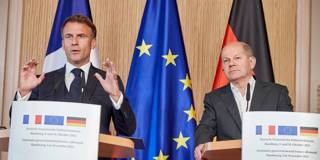Following a recent, highly public disagreement, French and German leaders urgently need to get back on the same page. At a time when Europe is facing a war of conquest on its eastern border and the potential return of an isolationist American president, solidarity among major European Union members is more important than ever.
BERLIN – The Franco-German relationship has always been complicated and never free of conflict or tension. Everyone understands that cooperation between these two key European Union countries is necessary and in the interest of the entire bloc. Nonetheless, they have never fully overcome their current – and historic – rivalry.
One reason is that France and Germany are equally strong, albeit in different dimensions. Over the past seven decades of gradual European unification, Germany – though divided between 1945 and 1990 – was economically powerful but diplomatically diffident. France, by contrast, boasted military and cultural strengths and an unbroken tradition as a European power. Following Germany’s defeat in World War II, Charles de Gaulle made a point of fully asserting France’s renewed confidence.
Germany was the exact opposite. At the end of WWII, it was a failed power with a reputation for triggering European disasters. The German state and culture had come to be defined by the complete moral bankruptcy of the Hitler era. The Nazis had dragged Germany into a state of barbarism, deploying modern technologies and pseudoscientific theories to commit genocide against European Jews, Roma, and others, and to lay waste to large swaths of the European continent. In short, the Germans had Hitler, who had led them into the abyss, leaving a lasting legacy of shame, whereas the French had de Gaulle, the savior of the nation in its darkest hour.

BERLIN – The Franco-German relationship has always been complicated and never free of conflict or tension. Everyone understands that cooperation between these two key European Union countries is necessary and in the interest of the entire bloc. Nonetheless, they have never fully overcome their current – and historic – rivalry.
One reason is that France and Germany are equally strong, albeit in different dimensions. Over the past seven decades of gradual European unification, Germany – though divided between 1945 and 1990 – was economically powerful but diplomatically diffident. France, by contrast, boasted military and cultural strengths and an unbroken tradition as a European power. Following Germany’s defeat in World War II, Charles de Gaulle made a point of fully asserting France’s renewed confidence.
Germany was the exact opposite. At the end of WWII, it was a failed power with a reputation for triggering European disasters. The German state and culture had come to be defined by the complete moral bankruptcy of the Hitler era. The Nazis had dragged Germany into a state of barbarism, deploying modern technologies and pseudoscientific theories to commit genocide against European Jews, Roma, and others, and to lay waste to large swaths of the European continent. In short, the Germans had Hitler, who had led them into the abyss, leaving a lasting legacy of shame, whereas the French had de Gaulle, the savior of the nation in its darkest hour.